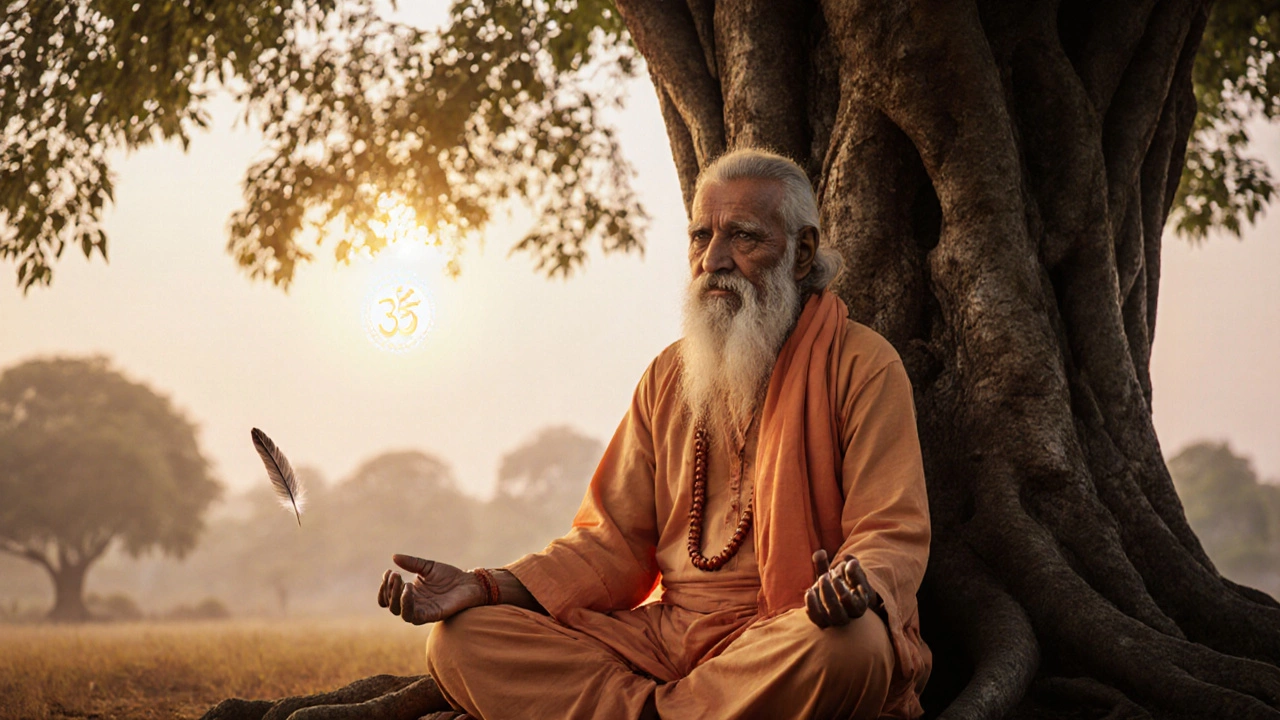India isn’t famous just for its spices, temples, or Bollywood. It’s famous because for over 5,000 years, people here have asked the same deep questions: Who am I? Why am I here? What is real? And they didn’t just guess-they lived the answers. That’s why spiritual quotes from India carry weight. They’re not polished slogans for Instagram. They’re echoes from sages who sat under trees, meditated for decades, and spoke in simple truths that still shake people today.
What Makes Indian Spiritual Quotes Different?
Most motivational quotes today tell you to hustle harder, aim higher, or believe in yourself. Indian spiritual quotes do something quieter but deeper. They ask you to let go. To stop chasing. To see that peace isn’t something you find-it’s something you remember.
Take the Bhagavad Gita: ‘You have the right to perform your duty, but never to the fruits of action.’ That’s not advice for a CEO. That’s a lifeline for someone burning out. It says: Do your work. Don’t attach your worth to the outcome. That idea came from a battlefield over 2,500 years ago-and it still calms people in Toronto, Tokyo, or Tel Aviv today.
Compare that to a modern quote like ‘Success comes to those who hustle.’ It’s energizing, sure. But it also adds pressure. Indian wisdom doesn’t add pressure. It removes it. That’s why people from all over the world keep coming back to these lines.
Where Do These Quotes Come From?
These aren’t random sayings pulled from a book. They come from ancient texts that shaped how millions live. The Upanishads, the Vedas, the Yoga Sutras, the Dhammapada-these aren’t just religious books. They’re manuals for living with clarity.
The Upanishads say: ‘Tat Tvam Asi’-You are that. Meaning, the same consciousness that moves the stars lives inside you. No ritual, no temple, no priest needed. Just awareness.
Patanjali’s Yoga Sutras don’t talk about bendy poses. They say: ‘Yogas chitta vritti nirodhah’-Yoga is the stilling of the mind’s chatter. That’s it. Not 100 poses. Not a $500 mat. Just quieting the noise.
And then there’s the Dhammapada, from the Buddha: ‘Hatred does not cease by hatred, but only by love. This is the eternal rule.’ Simple. Brutal. True. You don’t need to be Hindu, Buddhist, or even religious to feel that in your bones.
Why Do People Still Quote Them Today?
Because modern life is loud. We’re told to consume more, post more, achieve more. But inside, many feel empty. That’s when these quotes hit.
Think about someone stuck in a 9-to-5 job, scrolling through feeds full of perfect lives. They read: ‘When you are angry, you are letting someone else control your peace.’ Suddenly, they pause. They breathe. That’s not inspiration. That’s recognition.
These quotes work because they’re not about changing the world. They’re about changing how you see it. They don’t promise wealth. They promise presence. Not more, but enough.
A friend of mine in Toronto, raised in a secular home, started reading Rumi and Ramana Maharshi after her dad passed. She didn’t become religious. She became calmer. She stopped arguing with her husband over small things. She started sitting quietly every morning. Not to ‘manifest’ anything. Just to be. That’s the power of these quotes. They don’t sell you a dream. They remind you of what’s already there.

Famous Spiritual Quotes from India (and What They Really Mean)
- ‘Anandamayo ’bhyasat’ (Taittiriya Upanishad) - ‘You are made of bliss.’ Not ‘you deserve bliss.’ Not ‘you’ll find bliss.’ You are bliss. The feeling you chase in vacations, relationships, or new jobs? That’s your true nature. You’re just forgetting it.
- ‘Yada yada hi dharmasya glanir bhavati’ (Bhagavad Gita) - ‘Whenever dharma declines, I manifest.’ This isn’t about gods showing up. It’s about human responsibility. When injustice grows, it’s up to you to act-not wait for a savior.
- ‘The mind is everything. What you think, you become.’ (Buddha) - Not ‘think positive.’ Not ‘visualize success.’ Your thoughts shape your reality. If you keep thinking you’re stuck, you will be. Change the thinking, change the life.
- ‘Do not dwell in the past, do not dream of the future, concentrate the mind on the present moment.’ (Buddha) - This isn’t mindfulness fluff. It’s survival. The past is gone. The future doesn’t exist. Only now is real. And now is all you have.
- ‘The soul is neither born nor dies. It is eternal, unchanging.’ (Bhagavad Gita) - This quote helped millions face death without fear. Not because they believed in heaven. But because they understood: you are not your body. You are the awareness behind it.
Why These Quotes Resonate Across Cultures
People in Germany, Brazil, or Japan don’t know Sanskrit. They’ve never visited Varanasi. But they still feel these words. Why?
Because they speak to something universal. The fear of death. The search for meaning. The exhaustion of trying to be enough. India didn’t invent these struggles-but it gave some of the clearest answers.
Unlike Western philosophy, which often debates ideas in books, Indian wisdom is rooted in experience. It’s not theory. It’s practice. You don’t read the Gita to understand it-you read it to live it. That’s why it lasts.
Modern neuroscience now confirms what sages said: meditation reduces stress, quieting the mind improves decision-making, letting go of attachment lowers anxiety. The science is catching up. But the wisdom? It’s been here all along.

How to Use These Quotes Without Turning Them Into Decor
Don’t just post them on your wall. Don’t save them in a notes app. That’s decoration. Real use is different.
Here’s how to make them live:
- Choose one quote that hits you. Not the prettiest one. The one that makes you uncomfortable.
- Write it on a sticky note. Put it on your mirror. Or your laptop.
- Every morning, read it slowly. Don’t rush. Let it sink in.
- Ask yourself: ‘How does this change how I act today?’
- At night, reflect: Did I live this today? If not, why?
That’s it. No apps. No courses. Just one line. One day. One choice.
One woman in Delhi told me she used ‘Be the change you wish to see’ every time she felt like complaining about traffic. Instead of yelling, she’d take a breath and drive slower. One day, she noticed the person behind her smiled. That’s the ripple. That’s the power.
What These Quotes Won’t Do
They won’t make you rich. They won’t get you a promotion. They won’t fix your broken relationship overnight.
What they will do? They’ll help you stop fighting yourself. They’ll help you stop blaming others. They’ll help you stop waiting for the ‘right time’ to be happy.
That’s not magic. It’s medicine. And it’s been free for thousands of years.
Final Thought: You Don’t Need to Believe in India to Believe in These Words
You don’t need to wear a kurta. You don’t need to chant. You don’t need to visit a guru. All you need is a quiet moment. And a willingness to ask: Is this thought serving me? Is this desire bringing me peace-or more noise?
India’s spiritual quotes aren’t about religion. They’re about reality. They’re not saying ‘believe in me.’ They’re saying: ‘Look inside. You already know.’
Why are Indian spiritual quotes so popular worldwide?
They’re not flashy or trendy-they’re timeless. These quotes come from deep, lived experience, not marketing. People worldwide feel overwhelmed by modern life, and these words offer a quiet way out: stop chasing, start being. They don’t promise quick fixes, but lasting peace. That’s why they travel across borders and centuries.
Do you need to be Hindu or Indian to understand these quotes?
No. These quotes speak to universal human experiences-fear, longing, peace, identity. You don’t need to believe in karma or reincarnation to feel the truth in ‘The mind is everything.’ You just need to be human. That’s why people from every culture, religion, or none at all find meaning in them.
Are these quotes still relevant in today’s fast-paced world?
More than ever. When you’re flooded with notifications, deadlines, and comparisons, the advice to ‘be still’ or ‘let go of results’ isn’t outdated-it’s revolutionary. Studies show mindfulness reduces anxiety and improves focus. These quotes are ancient mindfulness tools. They’re not relics. They’re remedies.
Can spiritual quotes really change your life?
Not by themselves. But used daily, they shift your thinking. One quote, repeated with awareness, can break a cycle of stress or self-doubt. It’s like turning down the volume on your inner critic. Over time, that changes how you respond to everything-from traffic jams to arguments with loved ones. Change doesn’t come from reading more. It comes from living one truth at a time.
Where should I start if I want to explore Indian spiritual quotes?
Start with the Bhagavad Gita’s Chapter 2, verse 47: ‘You have the right to perform your duty, but never to the fruits of action.’ It’s short, clear, and practical. Or try Buddha’s Dhammapada, verse 5: ‘Hatred does not cease by hatred…’ Read one line a day. Sit with it. Don’t rush. Let it work on you, not the other way around.
